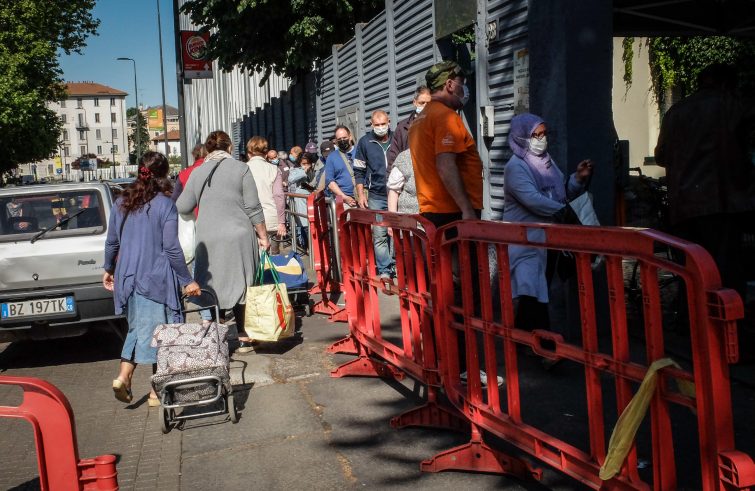
More than half of Italy’s poor – 56% – are not receiving Citizenship Income. The remaining 44% of poor households entitled are mostly those unemployed, people who lost their jobs and without unemployment benefits or other forms of income support. The new poor due to the pandemic, especially young couples with children, were not eligible for Citizenship Income, and job inclusion schemes are hard to access. In spite of this, Citizenship Income should be continued and “reorganized.” Concrete proposals on stepping up its scope and effectiveness have been put forward. “Having overcome the emergency situation, structural responses against poverty must be devised and adapted to today’s society.” These are the findings of the 6th Report on Anti-Poverty Measures published by Caritas Italy, which conducted an exhaustive survey on the Citizenship Income measure adopted in 2019, with focus groups and practical advice on how to re-formulate it to effectively combat poverty. Government data show that approximately 3.7 million citizens, including 1,350,000 children and young adults, as well as 450,000 people with disabilities, are currently receiving Citizenship Income. The total sum allocated in 2020 amounts to over EUR 8 billion. However, while the support scheme benefited very low income brackets, some groups were left out. According to the Caritas Report, they include “new categories of poor households most affected by the pandemic”, i.e. “those households with a young age group, children under 18 and low income.”
For all these reasons, Caritas has proposed an “Agenda” for reorganising Citizenship Income programmes. The project was presented on Friday in Rome in the presence of the Minister of Labour and Social Policies Andrea Orlando and Pasquale Tridico, President of Italy’s Social Security Institute (INPS).
“It is urgently needed.” “The Citizenship Income scheme should be continued, but it should also be reorganised”, said Don Francesco Soddu, director of Caritas Italy, during the presentation of the Report in Rome.
“We have come here to reaffirm the
need for a measure to combat poverty in our Country, now more than ever, especially after the economic and financial crisis caused by the pandemic.
Thousands of people in our country struggle to make ends meet, are unable to work, or, while employed, are caught in dire economic straits.”
The impact of the pandemic. The households that suffered the worst impact of the pandemic and accessed Citizenship Income in 2020 were those with incomes ranging from €1,000 to €1,299. This figure “can be read as a preliminary indication of the impact of the pandemic on median-income households.” These include, in particular, “households with children, suffering the worst consequences.”
Excluded. The Report identified the specific features of those excluded from the minimum income scheme: most of these households are in the North of the Country, with children, a foreign national applicant, and bank savings above the maximum threshold. Four in ten immigrant households are presently excluded from eligibility for Income Support. Movable assets represent the requirement that most restricts access to the measure for households living in extreme poverty (only two thirds of them meet this requirement). In the North, 37% of households in extreme poverty have access to the income support measure, 69% in the Centre and 95% in the South.
Caritas users. As concerns Caritas users, it emerges that 55.2% of assisted persons have benefited from the measure between 2019 and 2020. Moreover, 56% of recipients had three or more forms of vulnerability.
Job inclusion. As of 31 January 2021, the households benefiting from Citizenship Income referred to job inclusion schemes were approximately 530,000 nationwide, 49% of the total number of households referred, based on their profiles, to public employment or social services. The data show that, as of 31 January 2021, 5.1 per cent of the beneficiaries were not required to comply with formal obligations, 48.3 per cent had been referred to social inclusion programmes and 46.6 per cent to employment services. The process is as yet proceeding at a slow and complex pace, further hampered by the outbreak of the pandemic.
The profile of recipients identified in the focus groups is that of “extremely vulnerable persons in terms of employment, and in severe economic, psychological and social difficulties. More often than not, they include individuals without compulsory education qualification, or young adults neither in employment nor in education and training, or lagging behind in their studies. They all have smartphones, but they don’t know how to use them to surf the web. They don’t know how to write a résumé and, in some cases, they don’t speak Italian.”72% have a middle school diploma at the best, while only 3% have a university degree. Among the recipients, 21% never had a salaried job. People under 30 and over 50 account respectively for 34% and 27% of the beneficiaries registered under the Pact for Labour. The under-30s are concentrated in the South and the islands, while those over-50 are prevalent in the Centre-Northern regions.
Basic needs: food, housing and bills. The main causes of poverty revolve around the lack of sufficient financial resources to meet three basic needs: food, housing and bills. Despite the Citizenship Income, difficulties persist “especially where the amount granted is extremely low or insufficient to meet basic needs.” Suspension of the subsidy at the 18th month was one of the most frequently reported problems, resulting in people having to turn to Caritas or other private charities to ask for help. Some respondents said they felt uneasy about this situation and felt “ashamed”, but at the same time they were unable to regain economic independence.












